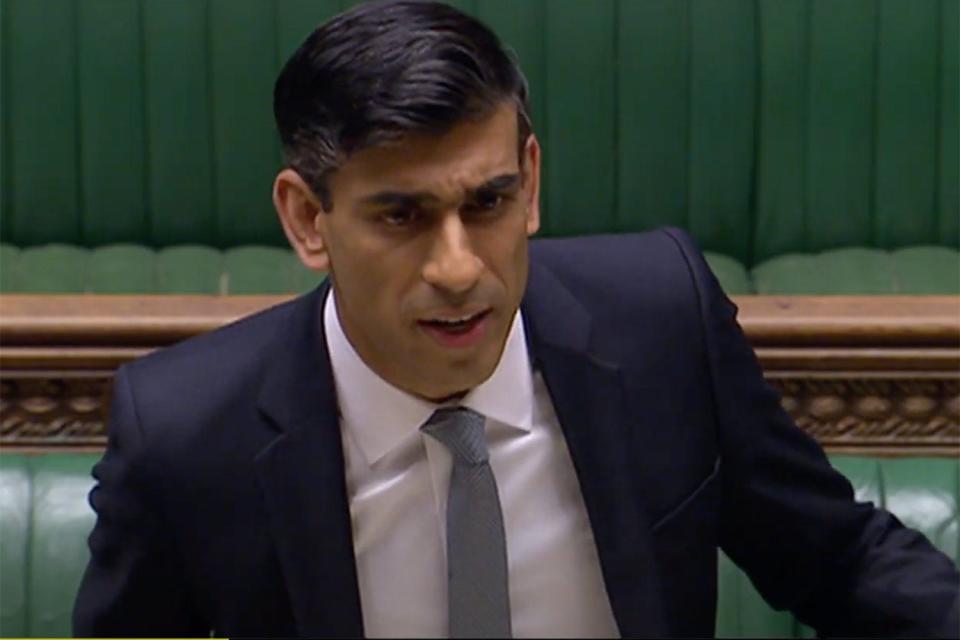Public spending during coronavirus crisis soars to £190bn

Public spending amid the coronavirus crisis has risen to nearly £190bn, the Treasury’s latest figures have disclosed.
Chancellor Rishi Sunak announced a £30bn package to combat economic damage from the pandemic in his summer statement on Wednesday, bringing the total spending to nearly £190bn.
Mr Sunak also revealed that before the latest measures, direct spending on the crisis had risen to £158.7bn.
Many businesses expressed support for the Chancellor’s priority of saving jobs. However, some industries facing a crisis, such aviation, said they had been overlooked.
Meanwhile, politicians in Leicester, where government orders have forced many businesses to remain shut due to a local outbreak, were angered by the “brutal” lack of extra help for the city.
The Treasury’s total spending is nearly £3,000 for every person in the UK. It amounts to more than the entire planned health budget for 2020-21.
This rise in spending means the cost of the crisis has risen by more than 40% since last month, when it was estimated at £133bn by government's spending watchdog, the Office for Budget Responsibility.
The new spending will likely push the deficit above the OBR's latest estimate of around £300bn, according to the influential Institute for Fiscal Studies think tank.
Before the coronavirus pandemic began in the UK, the government had been expecting a deficit of £55bn.

The Treasury announced that £15bn of the new expenditure would go on buying personal protective equipment – such as gloves and masks.
The spending also includes £10bn for testing and tracing infected people. The total extra spending on health services has now risen to £32bn.
"There is a huge public services additional spending that we didn't really know about that was announced (on Wednesday). It was kind of skated over, but £15bn for PPE for frontline workers is an enormous sum," Paul Johnson, director of the IFS, told the BBC.
He said the chancellor's strategy to spend money now to minimise long-term economic damage would be ultimately harmful.
"I don't think the chancellor is desperately worried about the size of the deficit this year. What will concern him is the size of the deficit the year after, and the year after, and the year after that," he said.
Politicians in Leicester said the local economy was facing serious damage. The city has been placed under the UK's first local lockdown due to an outbreak of the virus. No date has been announced for its reopening.
Leicester mayor, Sir Peter Soulsby, told the BBC he was "absolutely furious" that they had not received the expected help, calling the lack of support "brutal".
Leicester West MP and Labour's shadow social care minister Liz Kendall said Leicester residents had made "huge sacrifices" and were "desperate".
"I know it costs money and we all have to pay for it somehow but it will cost even more money if we don't keep our businesses open and we don't keep people in jobs. So I think there's a moral issue here - if we are in lockdown for longer we need help for longer," she said.
Ms Kendall released a letter in which Business Minister Nadim Zahawi said there were "no plans" to extend any of the support systems, such as the furlough scheme, in Leicester. He also claimed the city council had spent only £500,000 of a £3.5m discretionary grant it had received from government.
A government spokesperson said that "the circumstances of individual lockdowns will continue to be carefully assessed before appropriate action is taken".
Airlines UK also criticised the decision not to extend the furlough scheme beyond October, saying flights would likely still restricted during the winter.
"If the government continues to ignore aviation", this would mean more jobs would be lost, as well as the tens of thousands of redundancies already announced, a spokesperson for the trade body said.
During the Covid-19 pandemic, the Treasury has also spent £4.7bn on local government, £5.3bn on public transport, and £4.1bn on Scotland, Wales and Northern Ireland.
However, the impact of the coronavirus on UK economy and public finances is still uncertain.
The summer statement announced a plan to pay employers £1,000 for every furloughed worker they retain past January. If every furloughed worker were to keep their job, the total bill could rise as high as £9.4bn.
Read more
Sunak reveals spending on virus battle has risen to £190bn- LIVE

 Yahoo News
Yahoo News 
